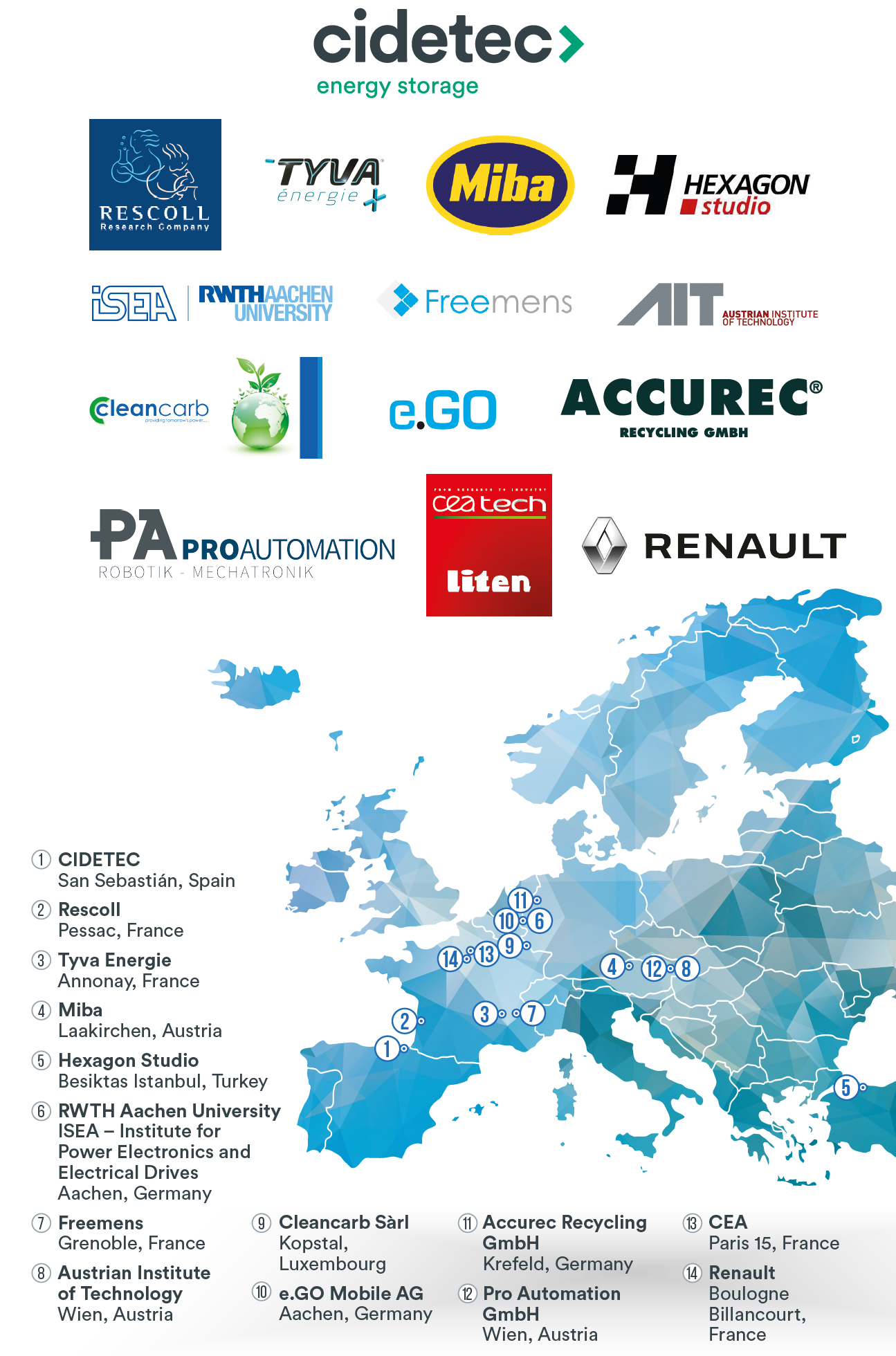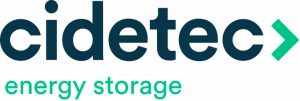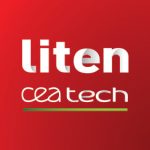The iModBatt consortium consists of 13 partners from 5 Member States (Germany, Austria, France, Luxembourg and Spain) and 1 partner from Turkey.

Firstly, managing a large consortium from different EU countries and a project with eight work packages provides a significant management challenge. Given their considerable experience in more than 30 EU FP projects, CID assumes the role of aggregating all project partners and leading the project in its entirety.
The Consortium includes industrial partners of every step of the BP manufacturing process value chain: OEM (RENAULT), (L)EV manufacturer (e.GO), BP manufacturer (TYVA ENERGIE), robotics and automation technology manufacturer (PROAUTOMATION), mechanical designer (HEXAGON), electrical designer and manufacturer (FREEMENS), active and passive cooling devices manufacturer (Miba), thermal interface material integrator expert (CLEANCARB), BP recycler (ACCUREC) and eco-design expert (RESCOLL). They will be supported by first order European Research centres, whose main activity will be focused on the BP characterization and support to the mechanical, electrical and thermal design of the BP (CEA, RWTH, AIT, CIDETEC).
iModBatt Consortium is fully prepared to get the proposed targets and these targets will not be achieved at lab scale, but at industrial scale, since most partners in the Consortium are product developers and manufacturers.
Our partners
CIDETEC are the coordinator of the project and the main results disseminator. Regarding specific topics, CIDETEC lead WP2 focused on cell selection and battery pack sizing. Their main role is in the characterization, modelling and simulation of commercial cells in order to fit he most suitable cell to the battery pack that will be designed. In the same WP2, they lead the battery pack sizing activity. On the other hand, as technical coordinator actively participate in technical discussion of all WPs and share leadership in the exploitation of results management with TYVA in WP8.
RESCOLL will be in charge of designing the battery pack with the selected partners and will provide the thermo-conductive material which will allow thermal dissipation of the battery. Furthermore, RESCOLL will conduct LCA and eco-design of the battery pack to assess environmental aspects and optimisation processes to be implemented during all project phases.
TYVA will lead WP3 by driving various expertise towards an overall finished product. It has the know-how to assess strengths and weaknesses of all ideas with the capacity to take a global view to sustain our goals and innovation capacity. By leading WP3, providing drivers and coordination for all other WPs, and exploiting the results through WP8, TYVA has a strong willingness to break new grounds in development and manufacturing of Lithium-Ion Battery Packs. Its main missions will be to make sure that the end results are exploitable, while preparing the product for its future industrialization.
Miba have extensive experience in the development and production of components for the automotive industry. Miba are the leader of WP4.The goal of WP4 is to define and develop the cooling system of the battery pack. This is a hybrid system composed of devices specifically designed for thermal balancing and some other structural components that support the thermal behaviour of the whole system. The main role of Miba in the consortium is the development, simulation and production of the thermal management components (cooling plates, heat pipes, etc.) and to participate in additional WPs to coordinate the interface to the cooling system.
HEXAGON contribute to the proposal in battery pack mechanical design and analysis activities. In detail, HEXAGON are responsible for designing battery pack cover mechanically from composite material in WP4. HEXAGON are also responsible for analysing mechanical design criteria from the vehicle point of view, that affects the battery pack, impact energy managements for several crash scenarios, battery housing design and mountings behaviours in vehicle space. HEXAGON support partners during manufacturing/integrating/testing of the designed battery pack module.
RWTH take part in WP2, where commercial battery cells are characterized and electrical models parameterized together with CIDETEC. In WP3, RWTH optimize the mechanical structure of the battery module and improve the electrical design. In WP4, the thermal system is defined together with the project partners. Furthermore RWTH design the thermal control loop of the battery pack and simulate different cooling approaches.
FREEMENS will be responsible for implementing a custom-made version of their off-the shelf BMS to fit inside the modular battery pack concept. We will also contribute to the global electrical architecture design in WP3, testing and assembly capabilities in WP5 and 2nd life the enabling with the development of cell performance identification algorithms at BMS level in WP7.
AIT are involved in cell selection and testing in WP2 as well as pack design in WP3 and 4. For these activities AIT mainly contribute the extensive know-how in electro-thermal design but also supports the other tasks. Furthermore AIT take part in the FMEA and other reviews. In WP6 AIT conduct various testing activities on the modules and in WP7 support the LCA activities. As research organization AIT is strongly committed to dissemination.
CLEANCARB support the thermal system design activities in WP4 namely in the area of heat exchanger design and thermal pad or thermal contact materials for heat transfer. CLEANCARB provide support for the battery pack assembly in WP5 for implementation of the thermal system. CLEANCARB also carry out project dissemination via its customers and through public trade shows and exhibitions as well as through its various cluster networks in Luxembourg and Ireland.
e.GO‘s role in the project is to integrate and validate battery packs developed by the consortium. Additionally, as a manufacturer of electric vehicles, e.GO set the requirements for batteries and monitors the suitability of the battery packs in the course of the project. e.GO’s main contribution is – respective to its role – in WP6, where 2 demonstrator vehicles are retrofitted to the new battery technology. Complex tests on climatic test benches and racetracks are then carried out to validate the performance and robustness of the newly developed battery packs.
ACCUREC contribute to the project with its expertise in the field of battery recycling. The main tasks cover the development strategies and methodologies for maximizing the material recovery, maintaining highest safety standards in WP7. Furthermore, ACCUREC develop design for recycling recommendations to cover the recycling demands in the development stage of an EV battery system.
PROAUTOMATION will lead the design and manufacturing of the BP module automated assembly unit in WP5. They will actively participate in the BP design to monitor that the design is feasibly for such industrial manufacturing way. So they will discuss the BP design in the main FMEA of WP3. They will also support the activities related to the BP disassembly in WP7. ProAutomation left the project at the end of 2018, their activities were taken over by TYVA.
The main role of CEA is the battery pack testing activity since they have suitable facilities to perform those tests. Additionally CEA will be one of the collaborators in WP2, where the cell is selected. They will stress the importance of cell safety and report on the most suitable cells from that point of view. In WP4 CEA will collaborate in WP3 in the battery pack design and with RWTH in the thermal control definition of WP4.
RENAULT will provide a mass-produced electric car (ZOE) and the data necessary for the redesign, assembly and integration of a new battery pack













